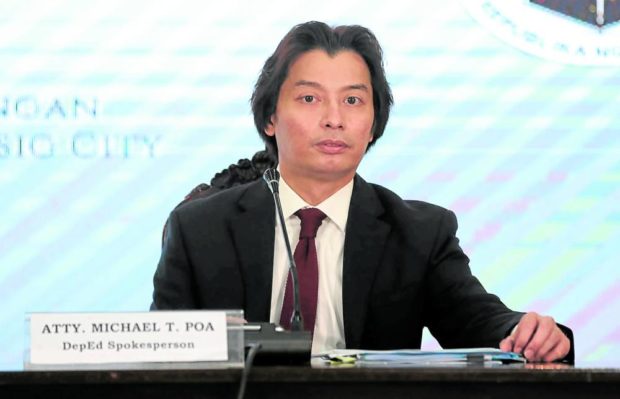Education department eyes boost to abuse probers

DepEd spokesperson Michael Poa (File photo by NIÑO JESUS ORBETA / Philippine Daily Inquirer)
MANILA, Philippines — To ensure the protection of students against abuse, the Department of Education (DepEd) is looking at boosting its Child Protection Unit (CPU), which formulates policies related to children’s rights in basic education.
“We would like to strengthen [it] because it’s mostly [an] advocacy at this point,” Michael Poa, spokesperson for DepEd, said at the National Children’s Month press briefing on Tuesday.
According to him, the CPU will hold a “child protection specialization course” for focal persons in regional and school division offices in November.
“There is also a training needs survey that is being conducted in order to identify the training that should be provided at the school level,” Poa said in a Viber message to the Inquirer.
“Aside from these, information drives will be undertaken which will include the dissemination of IEC (information, education and communication) materials on bullying at the school level,” he added.
Article continues after this advertisementDepEd earlier launched hotlines to receive complaints about abuses being committed in schools following reports about sexual abuse cases involving teachers at the basic education level.
Article continues after this advertisementDuring the press briefing, the Council for the Welfare of Children (CWC), an interagency body mandated to protect minors, said that it would also introduce a hotline called “Makabata Helpline 1383” to deal with child rights’ violations.
CWC executive director Angelo Tapales said the hotline would complement those being operated by the National Center for Mental Health (NCMH) and other concerned agencies.
He added that since the Philippines did not have enough resources to support the big infrastructure needed for a centralized emergency hotline, those set up separately by different agencies should complement each other with the aid of a proper referral system.
“In the helpline, NCMH is focused on mental health while we are focused on the violation of children’s rights. We would start with violence and dangers that they might be facing,” Tapales said.
“What we need is a proper referral system,” he added, noting that if the caller was seeking treatment or therapy, that person should be directed to the agency specializing in those areas.